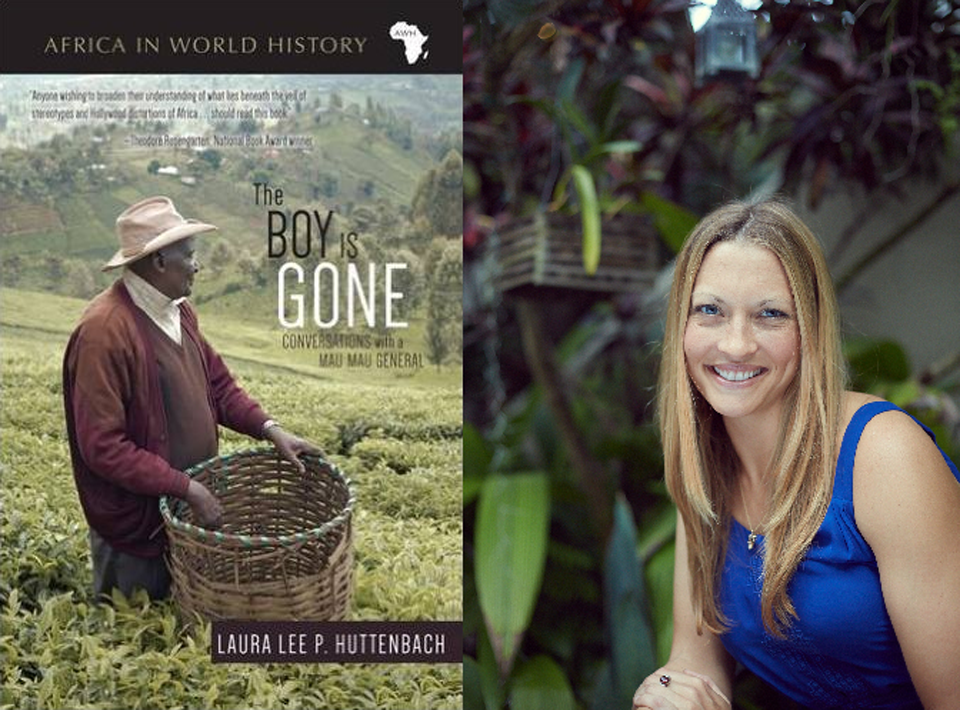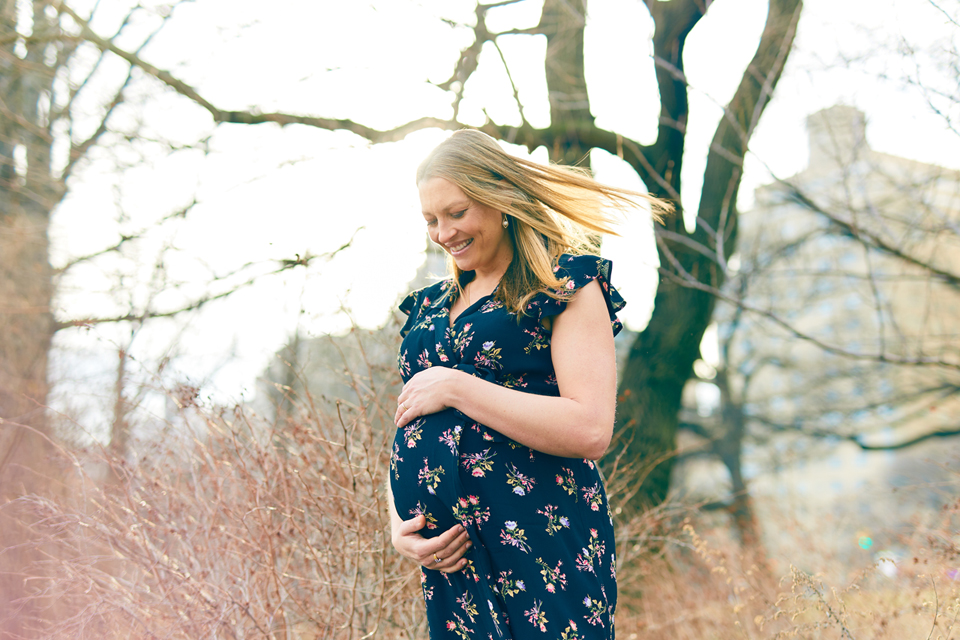39 Weeks Pregnant During a Pandemic — TODAY (41 weeks) IT’S A BOY !!

THEN: 2015
NOW: Spring, 2020
Editor’s note:
In March, 2016, we published a story about Laura Lee Huttenbach, who had presented at the Miami Book Fair, on the ArtSpeak website — see “From Mau Mau to Raven.”
Our story began: “Picture the 2001 State of Georgia Women’s Intersport Female Athlete of the Year. She’s a 5’9” four-sport athlete with brilliant blue eyes, long straight blond hair, and a disposition like a bright sunny day. Now imagine that Laura Lee Huttenbach, a recent graduate of the University of Virginia, is trekking alone through Kenya in 2006. In the remote Meru district, Laura Lee chances to meet Japhlet Thambu, an 85-year-old tea farmer also known as ‘The General,’ because he was a leader of the Mau Mau Revolution.
They bond like grandfather and granddaughter, and Laura Lee decides to document Thambu’s life, sitting at the feet of The General, recording his oral history in a dusty tradition that started to disappear with the arrival of British colonialists and ‘modern’ education.
The result of her conversations with The General is The Boy Is Gone: Conversations with a Mau Mau General, published by Ohio University Press in 2015, just after Thambu died.”
We have stayed in touch with Laura Lee, and every so often, we receive long emails with her travel stories and life experiences that she sends to friends and family. Below is an email dated March 19, 2020, reflecting on being 39 weeks pregnant, and self-quarantining in Manhattan with her husband Andy, during the era of COVID-19.
LETTER FROM LAURA LEE
March 19, 2020
Dear Ones,
A blog post on the popular baby site “The Bump” suggested that, at 38 weeks pregnant, it’s normal to experience some anxiety about giving birth and becoming a parent. “This feeling of being ready to Get. The. Baby. Out. might be even stronger if you’ve gained a significant amount of pregnancy weight, had a complicated pregnancy, or are 38 weeks pregnant with twins,” the author writes. “Try to keep your mind occupied with fun things. Go see a movie, have a special dinner with your partner, or get together with some friends for lunch. These are your last days or weeks before a newborn takes up all your attention, so enjoy them as much as you can.”
Today I’m 39 weeks pregnant—my due date is in one week—and in this time of COVID-19 and social distancing, these helpful blog tips are not so helpful. In New York City, like many American cities, restaurants, movie theaters, Broadway shows, gyms, sports arenas, and museums are closed. With all of the potential fears that I considered throughout my pregnancy, a global pandemic wasn’t on my radar. But! Everyone tells you that you should be flexible with your birth plan.
I haven’t written much about my pregnancy because nausea has been a pretty steady companion for the last nine months and interfered with my creative productivity. A writer friend whom I met at the Miami Book Fair some years ago shared a quote that I’ve always remembered: “Never try to write about the experience of a near drowning until you’re already safe back on land.” The idea, of course, is that if you want to provide hope for someone reading your story, it’s best to have some semblance of a positive outcome, a happy ending—or at least an ending you’ve come to find peace with and learned from. If you try to write when you still feel under water, you run the risk of just complaining or spreading your fear. That’s the time for journaling, or therapy, or long talks with a confidante who knows you’ll kick yourself to the surface and hit land eventually, and, once you’re there, she won’t remind you of the sad sack you were. You can only recognize something as a phase once you’re out of it.
As a writer, I have a pretty active internal dialogue. I store a lot of voices in my head and retrieve them when crafting a story. But for a while, when I’ve sat down to write, the loudest voice haunting my brain has been, “Puke! You want to puke!” So recently I’ve stuck to projects with more short-term deliverables and lower creative stakes, for example, doing copywriting for luxury real estate agents where my greatest literary challenge is, “What’s another way to say sun-drenched living room?”
I’ve also, through an organization called Church World Service, been teaching intermediate ESL to asylees just released from detention in New Jersey. My students come from all over—Chad, Congo, Cuba, Venezuela, Mauritania, Egypt, Guatemala, Sierra Leone, Togo, Sudan—and tell stories that make it difficult for me to spend too much time feeling sorry for myself about nausea.
I don’t equate the feeling of pregnancy to drowning, but I did want to welcome a healthy baby into the world before putting my impressions of the preceding months on paper. Many of my recent journal entries at some point make reference to, “And yeah, I still want to throw up,” which doesn’t make for compelling reading.
But anyway, here I am, close to D-Day (delivery day), living in the most populous American city during a global pandemic, and writing about it. Andy and I are grateful to report that we’re both healthy, and our doctors are confident that our baby is healthy.
Andy has been working remotely since last week, and we’ve been pretty much self-quarantining at home. I leave the apartment at least once a day to breathe fresh air and go for a walk in Central Park, and I have prenatal doctor’s appointments, but other than that, I try to stay home. (I imagine a total quarantine in a New York City apartment, without a backyard or much real estate, can drive a person mad.)
Yesterday we tried getting our groceries delivered for the first time. Whole Foods seemed to work well, except that there were a lot of items out of stock. For each unavailable item, Amazon sent me a message from my “personal shopper” suggesting substitutions. Most of these substitutions seemed reasonable, except one. For our order of a package of linguine pasta, the personal shopper recommended a can of coconut milk. So pasta is hard to come by in Manhattan, but if you know of any good recipes calling for coconut milk, please feel free to share. (Of course face masks, hand sanitizer, latex gloves, many cleaning supplies, and even toilet paper have been sold out for a while.)
I read an article in The New Yorker that in Xi’an, the capital of Shaanxi Province in China, where more than ten million people were ordered to quarantine, the government has been loosening restrictions, and people are starting to emerge from their homes. As this happens, officials have reported a spike in the city’s divorce rate. Some divorce lawyers and therapists predict a similar thing will happen in the United States. Fortunately, it’s been an easy and fun transition to make room for Andy at my home office (our dining room table), and the biggest confrontation we’ve had regarding appropriate workplace behavior was today, when I was playing Snoop Dogg and Pharrell’s classic, “Drop It Like It’s Hot,” to encourage the baby to drop, and Andy had to be on a conference call and found my dance moves distracting. He told me he wanted to speak to the head of HR, and I was like, “THAT’S ME.” (I wound up going to the bedroom and finishing the song there.)
On Tuesday, I discovered that I had all the ingredients necessary to make chocolate chip cookies. While some might believe that eggs, butter, and flour could be put to better use with the prospect of a food shortage in this city, I did not, and we now have plenty of cookies.
Hospital protocols are changing here every day, and we’re staying on top of what we need to do. If I’m symptomatic (coughing/fever) when I go into labor, I’m not allowed to enter the hospital through Labor & Delivery. Instead, I have to go through the Emergency Room, into a negative pressure room, and give birth in there. There isn’t much research available yet on pregnant women and COVID-19, but so far it looks like the virus isn’t transmitted in the womb from mother to baby. It also seems like the virus isn’t present in breastmilk. But, if a mother tests positive, as of now, our hospital separates mom and baby for up to two weeks to avoid transmission. This terrifies me, so we’re doing everything we can to stay healthy. There are so many uncertainties, and, like I said, protocols change every day, but right now you’re still allowed to have one person with you—your partner—during childbirth. (Usually, you’re allowed two people on your labor support team.) If you have a vaginal birth, they want to discharge you after 24 hours. If you need a Cesarean section, it’s 48 hours. (Normally, it’s 48 hours and 72 hours, respectively.) Hospitals don’t seem to be overrun at the moment, but we don’t know what things will look like during a surge of the virus.
A lot of the more standard maternal concerns around childbirth and caring for an infant have been replaced by concerns relating to an epidemic. And though I’d planned to kind of hunker down for the first 2-3 months after giving birth, this period of self-quarantining came early. For much of the pregnancy, my greatest fear has been preterm labor—and now, at 39 weeks, we’re entertaining the idea of induction to avoid hospital crowds and contracting the virus.
Some of the possible scenarios are scary, but we are hopeful that research has pointed to young, healthy people being able to get over the virus without much risk. (Though my age qualifies me as a geriatric pregnancy—seriously—I’m just hoping that designation won’t confuse COVID-19.) I’m also aware that babies have been born into much more uncertain or unstable worlds and gone on to survive and thrive. My Mom mentioned that her mother was born in spring 1918, during the peak of the Spanish flu epidemic. My father said that, during World War II, when his family didn’t have toilet paper in Holland, they used newspaper. “If you need to use newspaper, just remember to crumple it up before wiping,” he advised me on the phone yesterday. “If you don’t crumple it first, the paper will be slippery.”
I’m also reminded of my friend Feruz, from Eritrea, whose mother had her while fighting for her country’s independence from Ethiopia. When Feruz was born, hospitals could only tend to the patients who were dying. So when her mother went into labor, she walked out to the forest and squatted under a large tree. Feruz fell into soft soil, except for one pebble that pressed into her fragile face, leaving a permanent indention between her eyes. Over the bombs, nobody could hear Feruz cry when she entered the world on February 15, 1982.
So yes, there have been more threatening episodes in history for people to overcome. It doesn’t make this time easy, but I find it helpful to keep perspective. I’m almost more worried about my many loved ones who qualify as members of the “vulnerable” population by virtue of being over 65 or having respiratory issues or a compromised immune system. You are on my mind and in my prayers. Please do whatever you can do protect yourself and stay healthy.
I will, at some point, write more about this chapter of my life, and polish up some stories that have been temporarily filed in my “at work” folder, but, for now, I’m just trying to focus on the task at hand, to stay positive and nurture the life that’s been growing inside me.
This time of COVID-19 is uniquely weird and crazy—from inconvenient to scary—for everyone, and I just wanted to say I’m sending love and positivity your way.
xox,
Laura Lee



